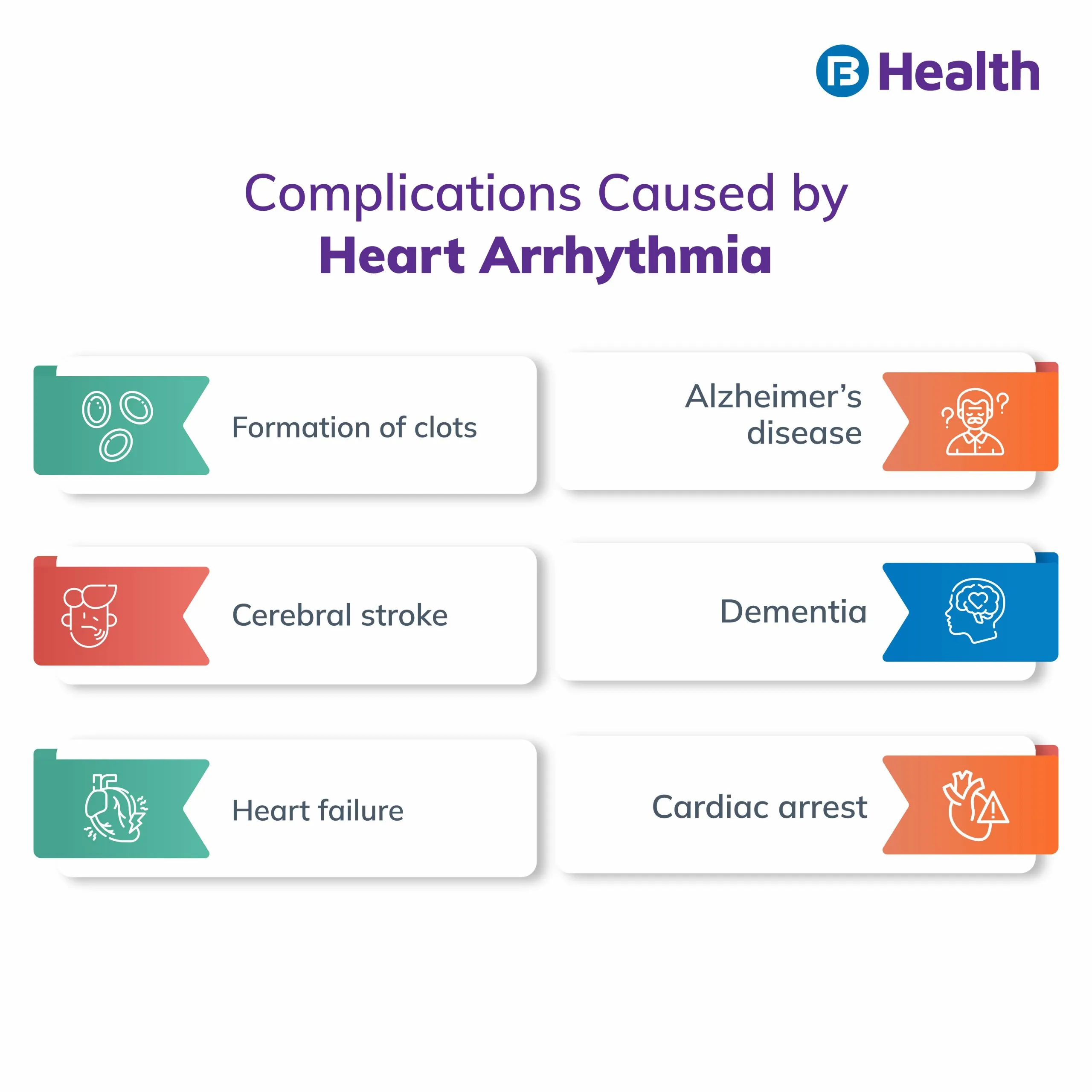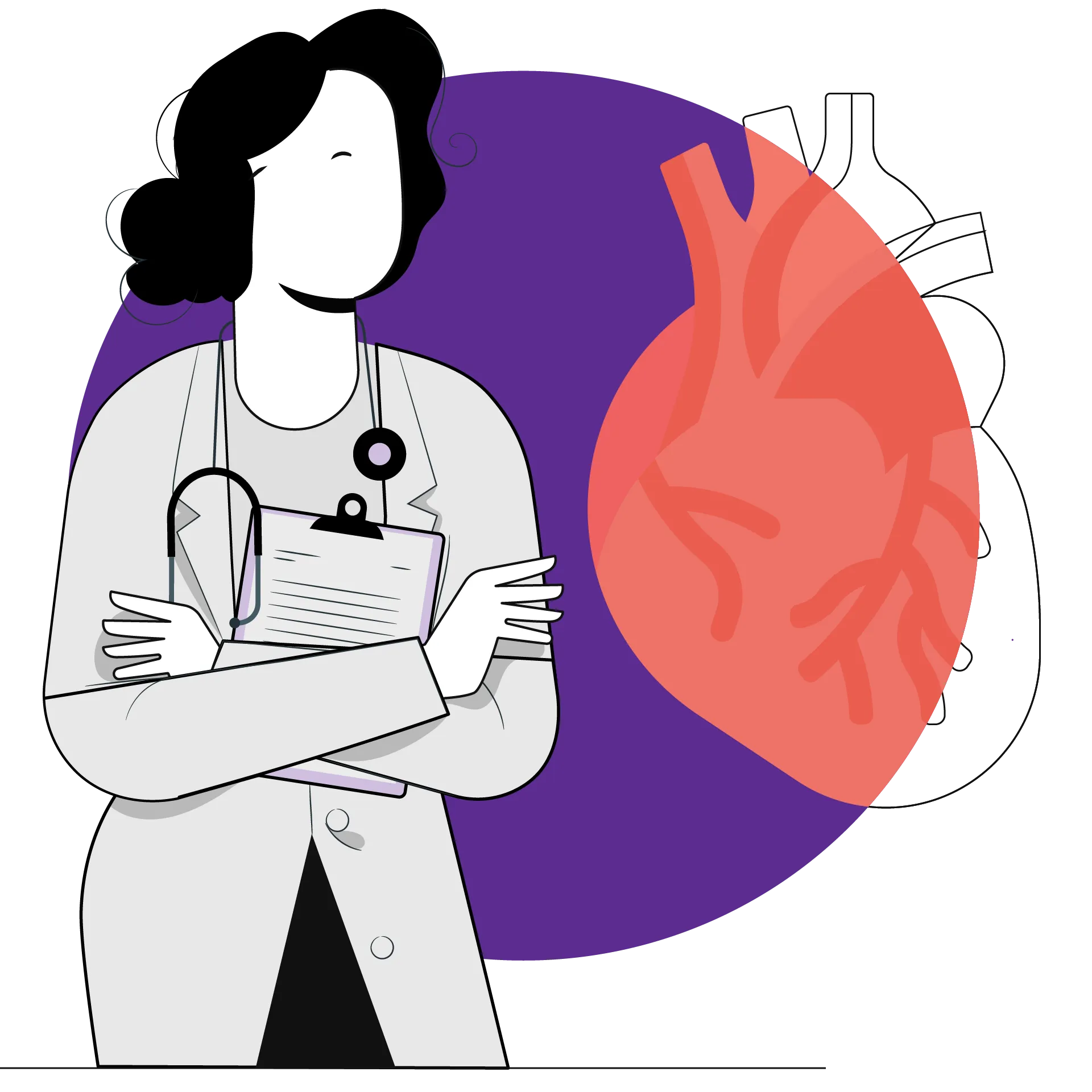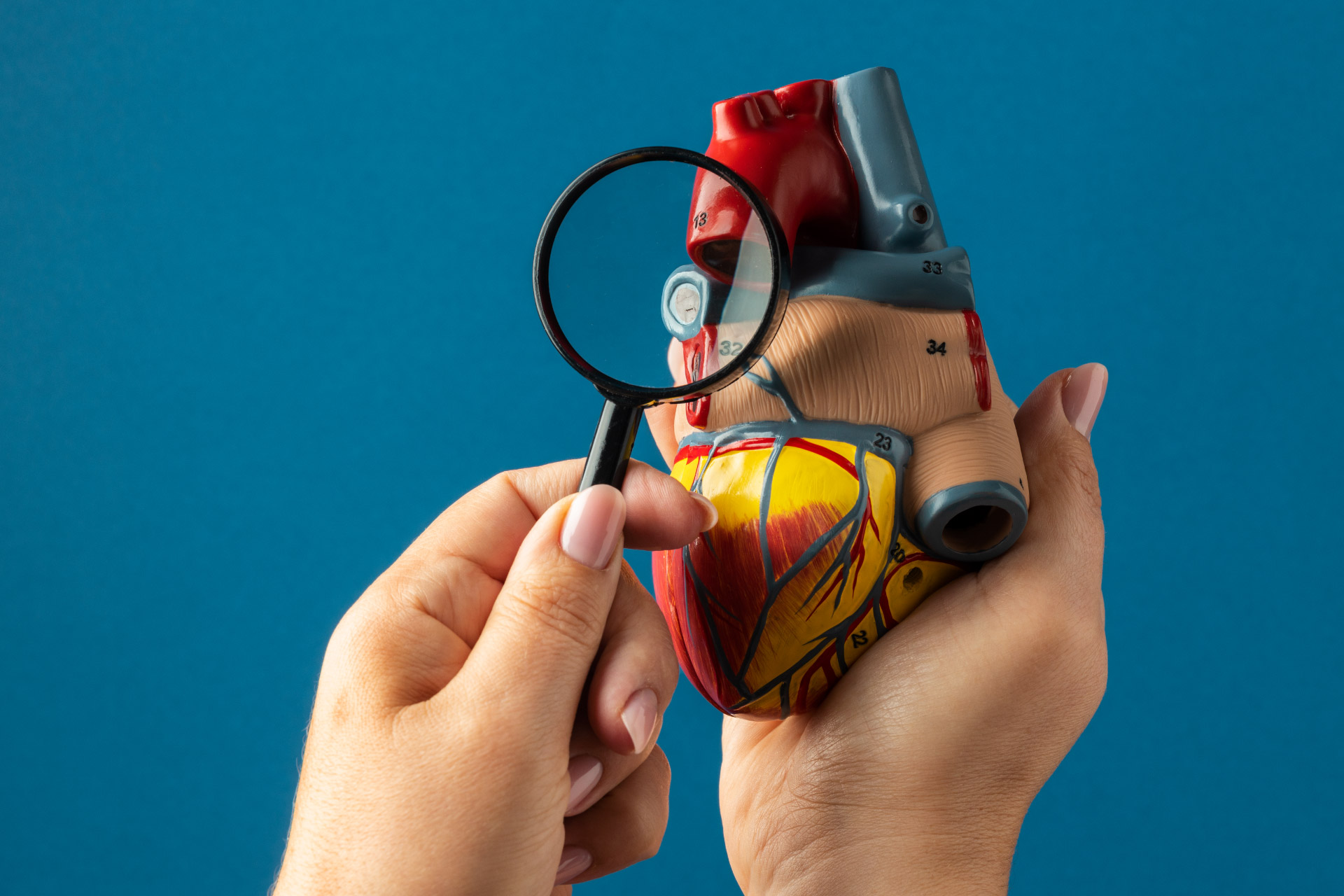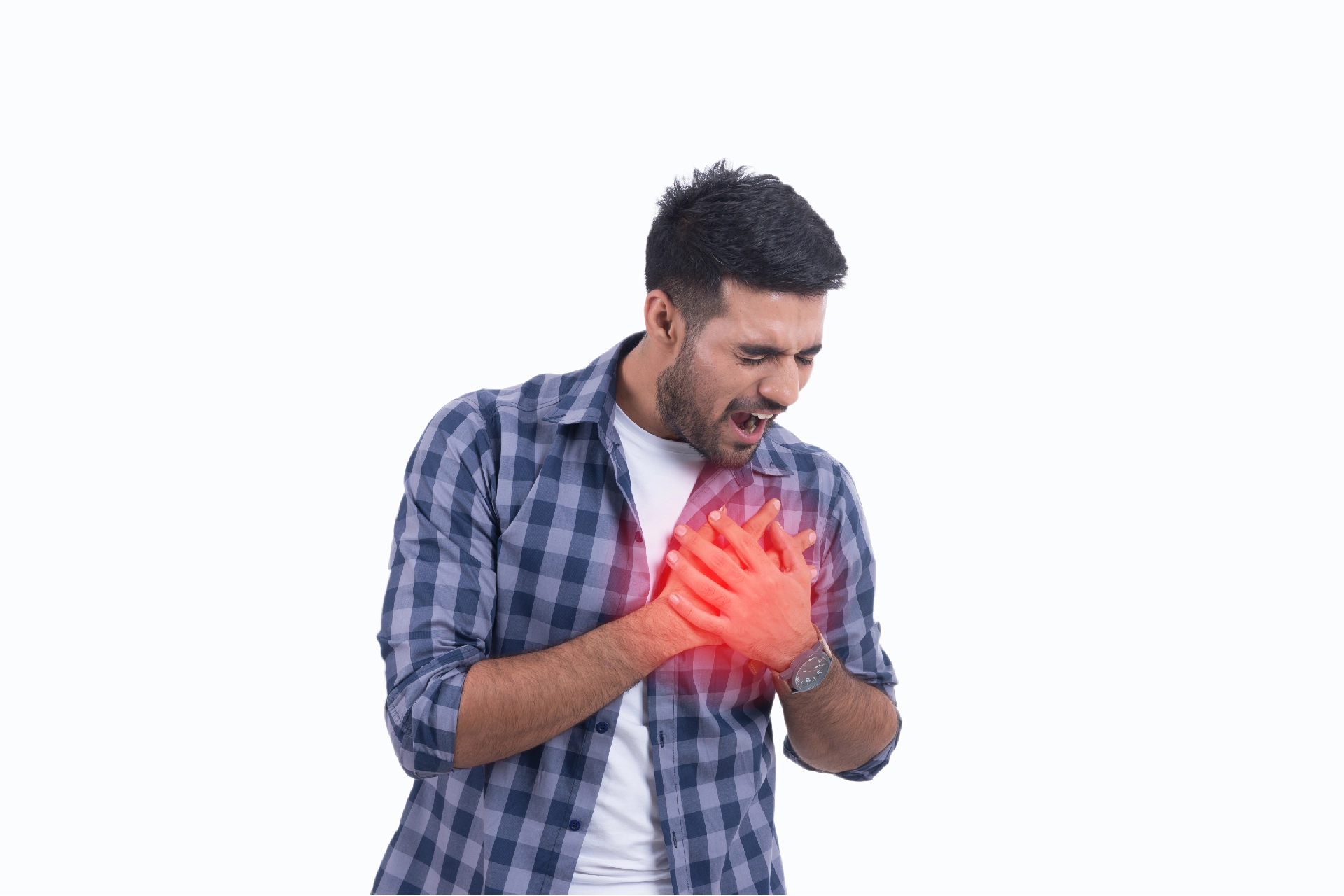Heart Health | 5 min read
Heart Arrhythmia: Symptoms, Causes and Treatments
Medically reviewed by
Table of Content
Key Takeaways
- Heart arrhythmia occurs due to interruption of electrical impulses
- Heart palpitations and chest pain are heart arrhythmia symptoms
- Heart arrhythmia treatment involves medications, lifestyle changes and surgery
Heart arrhythmia is a heart disease that develops when the electrical signals responsible for coordinating heartbeats do not function properly. In other words, heart arrhythmia implies an irregular heartbeat. Abnormal electrical signals make the heartbeat too fast, too slow, or irregular. However, a fast or slow heart rate during exercise or sleep is normal. Heart arrhythmia is usually harmless but can lead to severe symptoms and complications if it is highly irregular or caused by a damaged heart.
Among the Indian population, heart failure and cardiac arrhythmias are major contributors to non-communicable diseases. In fact, almost 40,000 to 50,000 heart failure or heart arrhythmia patients receive interventional device therapies [1]. These include radiofrequency ablation, pacemakers, implantable cardioverter defibrillators (ICD), and cardiac resynchronization therapy [2, 3]. Read on to know about heart arrhythmia causes, symptoms, types, and treatments.
Heart Arrhythmia Causes
This condition may be caused by any interruption to the electrical impulses responsible for stimulating heart contractions. There are several factors that may lead a heart to work abnormally. These include:
- Smoking
- Alcohol abuse
- Diabetes
- Genetics
- Substance use disorder
- Excessive coffee consumption
- COVID-19 infection
- Sleep apnea
- Anxiety or stress
- Valve disorders
- Certain supplements
- Injury due to heart attack
- Certain medical conditions
- Coronary artery disease
- Scarring of the heart due to previous heart attack
- Congestive heart failure or other heart diseases
- Hypertension or high blood pressure
- Overactive thyroid gland
- Underactive thyroid gland
- Process of healing followed by heart surgery
- Certain medications including cold and allergy drugs
- Structural changes in the heart
- Imbalance of sodium and potassium in the blood
 Additional Read: Congenital Heart Disease
Additional Read: Congenital Heart DiseaseHeart Arrhythmia Symptoms
A heart arrhythmia may not cause any symptoms. Your doctor may diagnose it by reading your pulse, listening to heartbeats or through diagnostic tests. These include electrocardiogram, Holter monitor, event monitor, echocardiogram, stress test, and others. If you develop any symptoms, they may include the following:
- Heart palpitations or fluttering in the chest
- Chest pain or tightness in your chest
- Pounding in the chest
- Feeling lightheaded or dizziness
- Shortness of breath
- Extreme tiredness
- Fatigue or weakness
- Fainting
- Anxiety
- Blurred vision
- Sweating
Types Of Arrhythmia
There are several categories of heart arrhythmias.
Tachycardia
It occurs when you have a fast heart rhythm with a heart rate of more than 100 beats a minute.
Bradycardia
Bradycardia occurs when you have a slow heart rhythm with a heart rate of fewer than 60 beats a minute.Supraventricular arrhythmias
These are arrhythmias that develop in the atria or the heart’s upper chambers.The types of supraventricular arrhythmias include:
- Atrial flutter
- Atrial fibrillation
- Atrial tachycardia
- Premature atrial contractions (PACs)
- AV nodal re-entrant tachycardia (AVNRT)
- Paroxysmal supraventricular tachycardia (PSVT)
- Accessory pathway tachycardias (bypass tract tachycardia)
Ventricular arrhythmia
These are arrhythmias that develop in the ventricles or the lower chamber of the heart. They include:
- Long QT syndrome
- Ventricular fibrillation (V-fib)
- Ventricular tachycardia (V-tach)
- Premature ventricular contractions (PVCs)
Bradyarrhythmias
It begins when you have a slow heart rate due to disorders in the heart’s conduction system. The types of bradyarrhthymias include:
- Heart block
- Sinus node dysfunction
Heart Arrhythmia Treatments
The treatment for heart arrhythmia depends on its severity. In some cases, treatment may not be required. For cases which need intervention, treatment options include medications, invasive therapies, electrical devices, lifestyle changes, and surgery.
1. Medications
Doctors usually prescribe antiarrhythmic drugs to convert the condition into normal sinus rhythm or to prevent it. They may also recommend taking heart rate-control drugs, anticoagulants, or antiplatelet drugs to reduce the risk of blood clots. Some medications to control heart arrhythmia include adenosine, atropine, beta-blockers, calcium channel blockers, digoxin, potassium channel blockers, and sodium channel blockers.
2. Lifestyle changes
Some modifications can reduce the risk of developing heart arrhythmia. These include quitting smoking, limiting alcohol and caffeine intake, and avoiding stimulants and certain activities that trigger it.
3. Invasive therapies
- Electrical cardioversion Delivering an electrical shock to the chest walls to synchronize the heart.
- Catheter ablation Delivering energy through the catheter to tiny areas of the heart muscle.
4. Pulmonary vein isolation
Use of special catheters to render bands of vein tissue.
5. Electrical devices
- Permanent pacemaker - It helps maintain a normal heart rate by sending electrical impulses to the heart muscle
- Implantable cardioverter-defibrillator - It is used to treat ventricular tachycardia and ventricular fibrillation
6. Surgery
If heart arrhythmia cannot be managed with medications or nonsurgical procedures, your doctor may suggest arrhythmia surgery. This is also done if you need valve or bypass surgery to address other heart diseases. Surgeons use the modified maze surgical procedures to treat atrial fibrillation.
Additional Read: Heart Attack SymptomsTo prevent the risk of heart disease like heart arrhythmia, make sure you take the necessary precautions. This includes monitoring blood pressure rates, eating a high blood pressure diet, and seeking timely medical help. Get doctor consultation on Bajaj Finserv Health by conveniently booking an online or in-clinic appointment. You can also book health tests including blood tests and heart tests using the platform.
References
- https://www.sciencedirect.com/science/article/pii/S0019483216301626
- https://www.heart.org/en/health-topics/arrhythmia/prevention--treatment-of-arrhythmia/implantable-cardioverter-defibrillator-icd
- https://www.hopkinsmedicine.org/health/treatment-tests-and-therapies/cardiac-resynchronization-therapy#:~:text=Cardiac%20resynchronization%20therapy%20(CRT)%20is,lower%20heart%20chambers%20(ventricles).
Disclaimer
Please note that this article is solely meant for informational purposes and Bajaj Finserv Health Limited (“BFHL”) does not shoulder any responsibility of the views/advice/information expressed/given by the writer/reviewer/originator. This article should not be considered as a substitute for any medical advice, diagnosis or treatment. Always consult with your trusted physician/qualified healthcare professional to evaluate your medical condition. The above article has been reviewed by a qualified doctor and BFHL is not responsible for any damages for any information or services provided by any third party.




